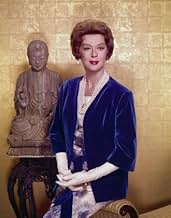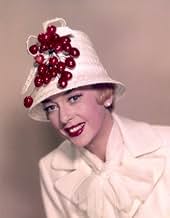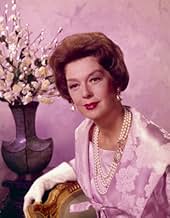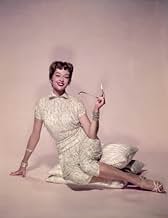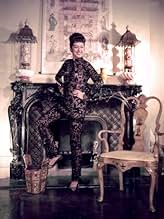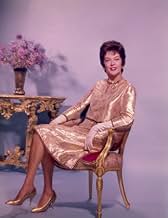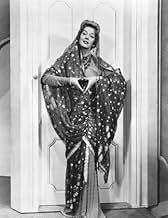AVALIAÇÃO DA IMDb
7,9/10
13 mil
SUA AVALIAÇÃO
Adicionar um enredo no seu idiomaAn orphan goes to live with his free-spirited aunt. Conflict ensues when the executor of his father's estate objects to the aunt's lifestyle.An orphan goes to live with his free-spirited aunt. Conflict ensues when the executor of his father's estate objects to the aunt's lifestyle.An orphan goes to live with his free-spirited aunt. Conflict ensues when the executor of his father's estate objects to the aunt's lifestyle.
- Direção
- Roteiristas
- Artistas
- Indicado a 6 Oscars
- 5 vitórias e 12 indicações no total
- Direção
- Roteiristas
- Elenco e equipe completos
- Produção, bilheteria e muito mais no IMDbPro
Avaliações em destaque
When "Auntie Mame" was first published, I read and re-read it (and its sequel, "Around the World with Auntie Mame") for several summers. Believe it or not, the books are even funnier than the film. They were not "memoirs," though that was the PR at the time. Edward Everett Tanner, or "Patrick Dennis," ultimately admitted as much. Auntie Mame was a creation from Tanner's own talented imagination.
No one ever has, or ever will, embody Auntie Mame as well as Rosalind Russell, who, by the time her Broadway performance in the role was filmed, had honed her portrayal to one of the finest in American theatre and film.
Listen to her vocal technique: from high girlish squeals to basso-profundo sarcasm.
Or watch her remarkable body language throughout -- from grande dame theatricality to lowbrow burlesque.
Russell's supporting players are magnificent -- from the 12-year old Jan Handzlik, through Coral Browne, Peggy Cass, Forrest Tucker, Fred Clark, Patrick Knowles, Connie Gilchrist, Yuki Shimoda, Robin Hughes, Roger Smith, Pippa Scott -- and, my own particular favorites who almost, but not quite, steal their scenes from Miss Russell: Willard Waterman, Lee Patrick and Joanna Barnes as the unforgettable Upsons.
George James Hopkins' brilliant sets and set design, and Orry-Kelly's amazing costumes, along with Branislau Kaper's score and Morton Da Costa's direction are like Tiffany settings, showing off this flawless cast at the top of their form.
Lawrence and Lee's original Broadway script was adapted by Betty Comden and Adolph Green, whose main contribution would appear to be the hydraulic furniture at the final dinner party.
The famous line, originally from the Broadway play and not found in the novel, is "Life is a banquet! And most poor sons-of-bitches are starving to death!" "Damn" and "hell" both are heard in the film: but "sons-of-bitches" was apparently too strong for the MPAA in 1958.
Is the film dated? I suppose. In the same way that "Citizen Kane" is dated, or "Some Like It Hot." It's also timeless. And Miss Russell's performance, here at the zenith of her long and distinguished comedic and dramatic career (Eugene O'Neill's "Mourning Becomes Electra," anybody?) is an acting lesson unto itself.
No one ever has, or ever will, embody Auntie Mame as well as Rosalind Russell, who, by the time her Broadway performance in the role was filmed, had honed her portrayal to one of the finest in American theatre and film.
Listen to her vocal technique: from high girlish squeals to basso-profundo sarcasm.
Or watch her remarkable body language throughout -- from grande dame theatricality to lowbrow burlesque.
Russell's supporting players are magnificent -- from the 12-year old Jan Handzlik, through Coral Browne, Peggy Cass, Forrest Tucker, Fred Clark, Patrick Knowles, Connie Gilchrist, Yuki Shimoda, Robin Hughes, Roger Smith, Pippa Scott -- and, my own particular favorites who almost, but not quite, steal their scenes from Miss Russell: Willard Waterman, Lee Patrick and Joanna Barnes as the unforgettable Upsons.
George James Hopkins' brilliant sets and set design, and Orry-Kelly's amazing costumes, along with Branislau Kaper's score and Morton Da Costa's direction are like Tiffany settings, showing off this flawless cast at the top of their form.
Lawrence and Lee's original Broadway script was adapted by Betty Comden and Adolph Green, whose main contribution would appear to be the hydraulic furniture at the final dinner party.
The famous line, originally from the Broadway play and not found in the novel, is "Life is a banquet! And most poor sons-of-bitches are starving to death!" "Damn" and "hell" both are heard in the film: but "sons-of-bitches" was apparently too strong for the MPAA in 1958.
Is the film dated? I suppose. In the same way that "Citizen Kane" is dated, or "Some Like It Hot." It's also timeless. And Miss Russell's performance, here at the zenith of her long and distinguished comedic and dramatic career (Eugene O'Neill's "Mourning Becomes Electra," anybody?) is an acting lesson unto itself.
Auntie Mame is a long movie, but it goes by as fast as a giggle!! There are few movies that I care to watch over and over again. I never tire of Auntie Mame because the screenplay is simply a brilliant piece of work. Comden and Greene are from the laudable days where one was expected to engage the brain when writing comedy! Practically every line is a quotable classic. Warner Brothers did us all a service by hiring theater director Morton da Costa to recreate the Broadway stage play. The movie is classy, sumptuously designed and brilliantly staged with those exquisite blackouts after each scene. Rosalind Russell should have won an Academy Award for this role (she refused to campaign for it) because no one will ever come close to getting that perfect timing that she displays in every scene. You love her from the moment she shakes the monkey's hand in the second scene. The supporting cast is perfection, especially Coral Browne, an undeservedly little known actress who makes a meal of Vera Charles. Peggy Cass is hilarious as Agnes Gooch; Forrest Tucker a charmer as Burnside. Everything about this picture makes it a true classic of the American cinema; one of those rare movies that makes you laugh, but even more important, makes you feel good!!! They don't get any better than this!
Sometimes you see a movie and you know that the actor or actress in it was born to play that part.
Clark Gable in Gone with the Wind
Bette Davis in All About Eve
Barbra Streisand in Hello, Dolly
Rosalind Russell in Auntie Mame
I love Russell and the parts she played. She was a liberated woman before the rest of the world knew that women needed to be liberated.
But in Auntie Mame she reached her peak. Mame is so vibrant and alive. She flaunts every one of Mame's eccentricities without stepping over the line into caricature. She also brings alive Mame's decency, compassion and tolerance. When I watch it, I almost feel ashamed of myself for being such a stick in the mud.
I enjoyed the musical with Lucille Ball, but all the way through it - I wanted it to be Rosalind Russell playing the part. It takes very little imagination on my part to hear her singing the songs. Rosalind, you are "just sensational" as Mame.
Clark Gable in Gone with the Wind
Bette Davis in All About Eve
Barbra Streisand in Hello, Dolly
Rosalind Russell in Auntie Mame
I love Russell and the parts she played. She was a liberated woman before the rest of the world knew that women needed to be liberated.
But in Auntie Mame she reached her peak. Mame is so vibrant and alive. She flaunts every one of Mame's eccentricities without stepping over the line into caricature. She also brings alive Mame's decency, compassion and tolerance. When I watch it, I almost feel ashamed of myself for being such a stick in the mud.
I enjoyed the musical with Lucille Ball, but all the way through it - I wanted it to be Rosalind Russell playing the part. It takes very little imagination on my part to hear her singing the songs. Rosalind, you are "just sensational" as Mame.
With a perfect match between character and actress, Rosalind Russell's unforgettable performance as "Auntie Mame" is almost enough to carry the whole movie by itself. The story is also interesting, if quite contrived, and most of the supporting cast helps out when needed. The variety of settings and situations also helps to make the movie an effective portrait of a life.
The story works best when taken as an appreciative but light-hearted portrayal of a memorable character. Many of Mame's adventures are stylized, and they work best when not taken too seriously. Given that, there are plenty of amusing sequences, and just enough thoughtful moments to maintain some balance.
Russell herself is in her element. With a character whom it is almost impossible to overplay, she gives the role plenty of energy and charm. She also works very well with the other characters, giving believable (given the character) and usually interesting reactions to what they say and do.
In the supporting cast, Forrest Tucker and Peggy Cass make good use of their scenes, and Fred Clark works well as Mame's frequent adversary. Coral Browne gets some good moments as Mame's old friend. The filming was approached in a rather stagy fashion, yet much of the time this seems appropriate. All told, the movie has a number of strengths, yet the memory most likely to remain is Russell's portrait of Mame herself.
The story works best when taken as an appreciative but light-hearted portrayal of a memorable character. Many of Mame's adventures are stylized, and they work best when not taken too seriously. Given that, there are plenty of amusing sequences, and just enough thoughtful moments to maintain some balance.
Russell herself is in her element. With a character whom it is almost impossible to overplay, she gives the role plenty of energy and charm. She also works very well with the other characters, giving believable (given the character) and usually interesting reactions to what they say and do.
In the supporting cast, Forrest Tucker and Peggy Cass make good use of their scenes, and Fred Clark works well as Mame's frequent adversary. Coral Browne gets some good moments as Mame's old friend. The filming was approached in a rather stagy fashion, yet much of the time this seems appropriate. All told, the movie has a number of strengths, yet the memory most likely to remain is Russell's portrait of Mame herself.
St. Iranaeous said it: "The glory of God is man fully alive."
Auntie Mame in her own way lives this life. This may not appear to be a deep movie. But, Mame lives a life that as Agnes Gooch says "I see what she's been living. And I see what I've been missing." She doesn't miss a moment. She's a caricature for so many of the things that go wrong with "growing up" and becoming "mature and responsible". At the end of the day Mame shows the possibilities of a life led to the full. Of a life that is truly vital and alive. This is a movie everyone who wants to leave this world without leaving money on the table should watch and take to heart. Mame is childlike, fun, and living without fear of what others think. This is on my top 10 list.
Auntie Mame in her own way lives this life. This may not appear to be a deep movie. But, Mame lives a life that as Agnes Gooch says "I see what she's been living. And I see what I've been missing." She doesn't miss a moment. She's a caricature for so many of the things that go wrong with "growing up" and becoming "mature and responsible". At the end of the day Mame shows the possibilities of a life led to the full. Of a life that is truly vital and alive. This is a movie everyone who wants to leave this world without leaving money on the table should watch and take to heart. Mame is childlike, fun, and living without fear of what others think. This is on my top 10 list.
Você sabia?
- CuriosidadesRosalind Russell broke her ankle in the first take of the scene where she comes flying down the stairs in the gown with the capri pants and shooting had to be delayed until she recovered.
- Erros de gravaçãoIn 1929 Mame and Lindsey talk about what Dr. Spock has to say on child rearing, a decade before his famous book was published.
- Citações
Mame Dennis: Oh, Agnes, where is your spine? Here you've been taking my dictation for weeks and you don't get the message of my book. Live, that's the message!
Agnes Gooch: Live?
Mame Dennis: Yes! Life is a banquet and most poor suckers are starving to death!
- ConexõesFeatured in AFI's 100 Years... 100 Laughs: America's Funniest Movies (2000)
Principais escolhas
Faça login para avaliar e ver a lista de recomendações personalizadas
Detalhes
- Data de lançamento
- País de origem
- Idiomas
- Também conhecido como
- Vivir es mi deseo
- Locações de filme
- Empresa de produção
- Consulte mais créditos da empresa na IMDbPro
Bilheteria
- Orçamento
- US$ 2.240.000 (estimativa)
- Tempo de duração
- 2 h 23 min(143 min)
- Proporção
- 2.35 : 1
Contribua para esta página
Sugerir uma alteração ou adicionar conteúdo ausente


